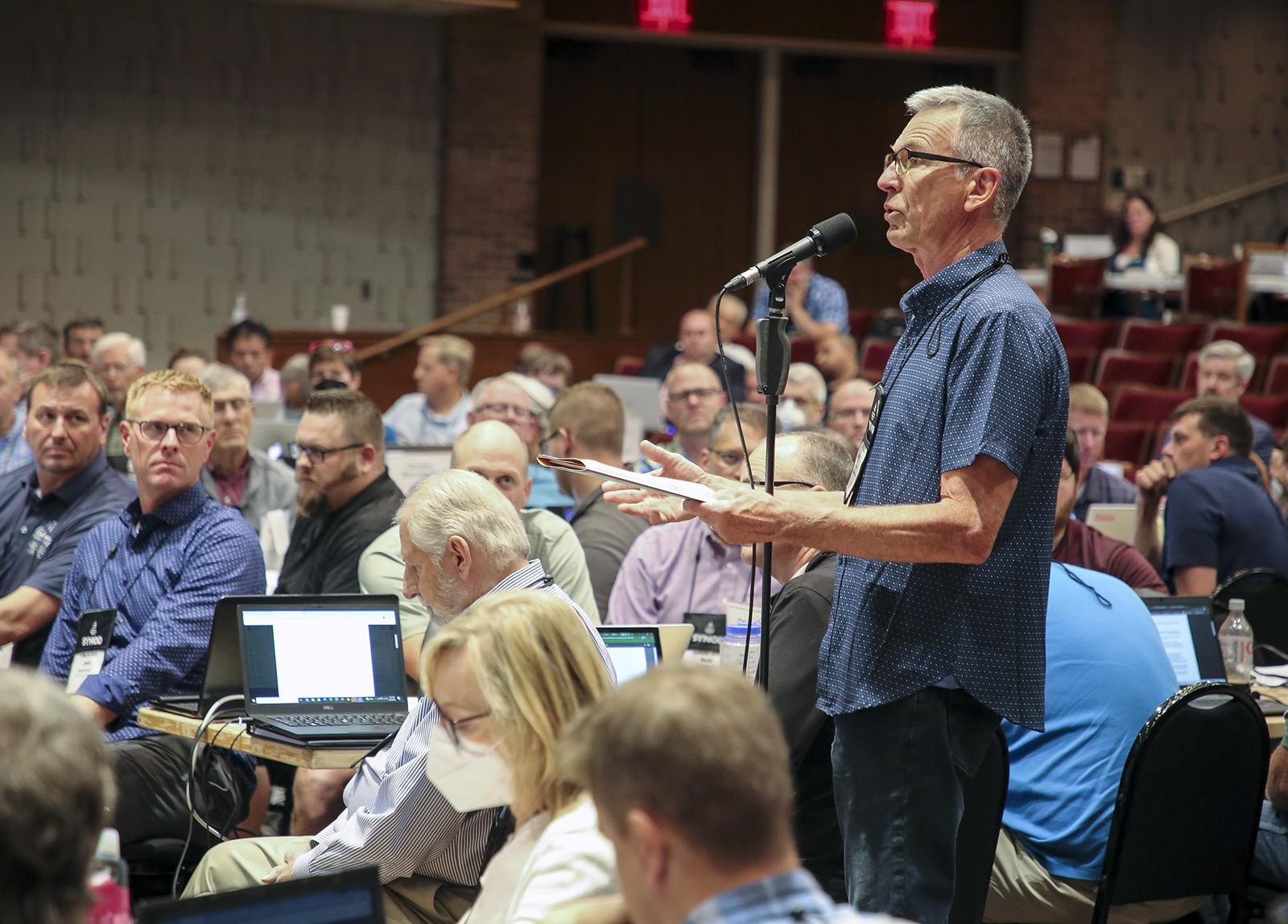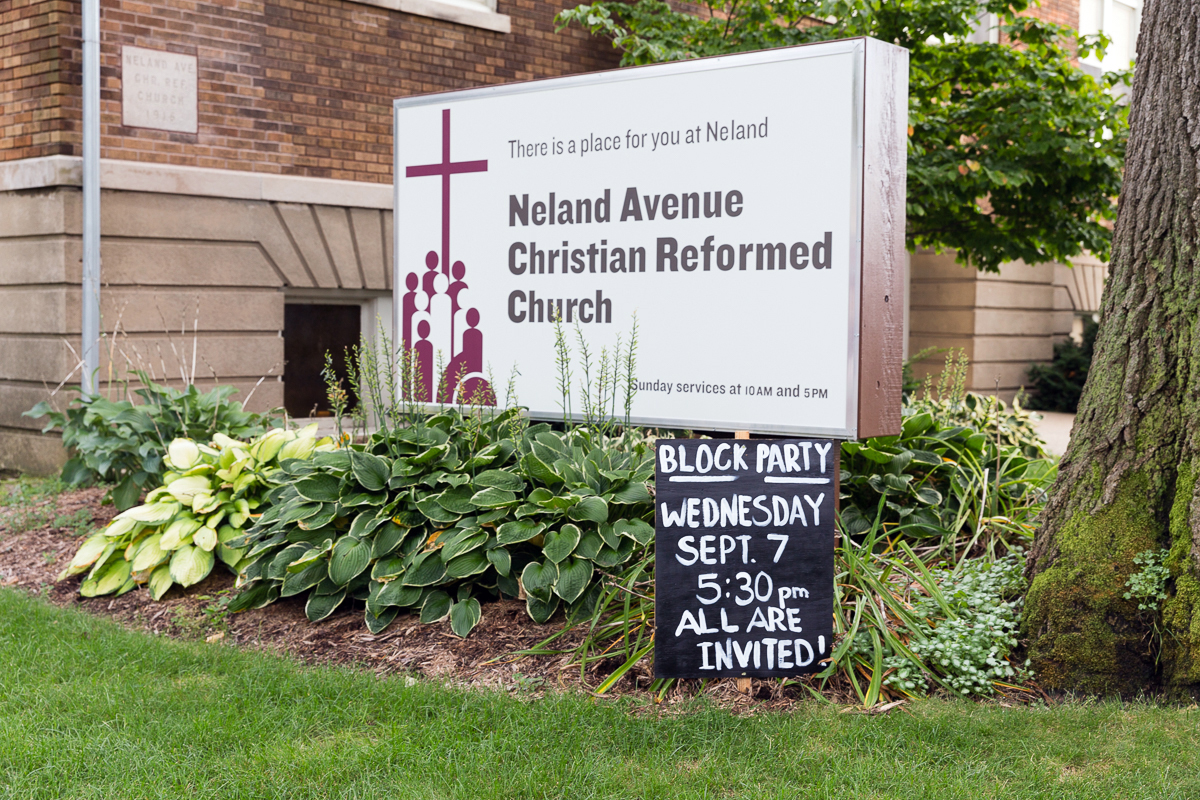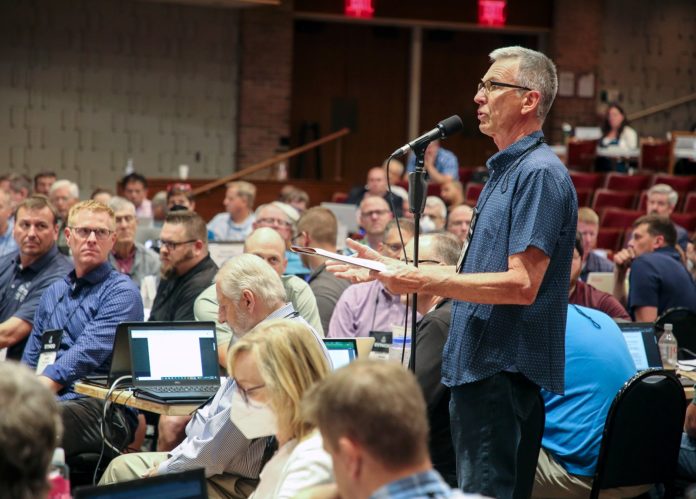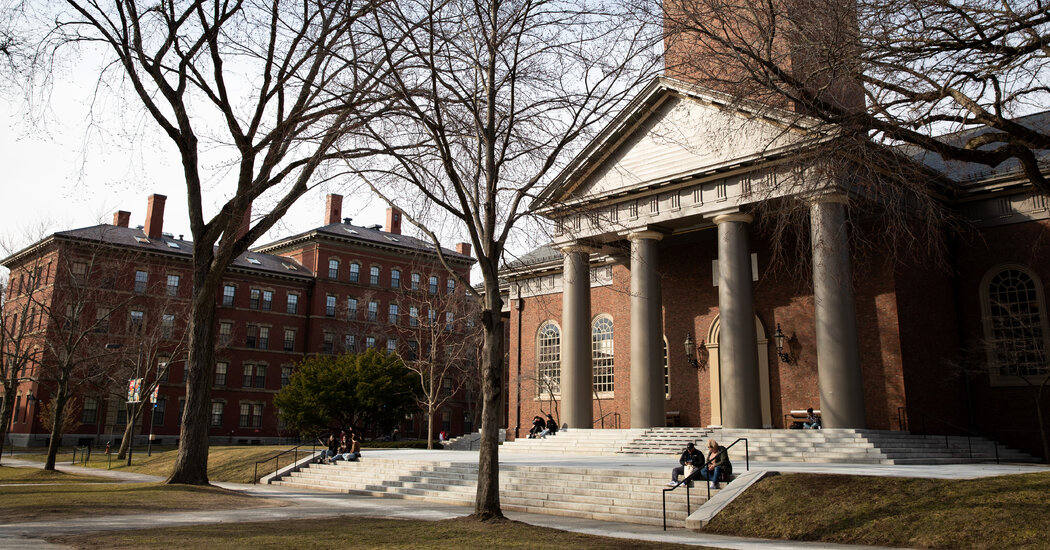(RNS) — When Neland Avenue Christian Reformed Church’s deacon first visited the church 27 years ago, it was the warmth of its members that initially impressed her.
As someone who had grown up in the Christian Reformed Church in Michigan, the woman recognized a few members from the larger Grand Rapids church community and they reached out after the service.
“They kept asking, ‘Where were you?’ and ‘Are you coming back?’”
She did come back, and alongside her partner, now wife, became a member and eventually a deacon, defined in the Christian Reformed Church as one who administers works of mercy on behalf of the congregation.
Now the Christian Reformed Church, which met for its annual synod last week, is demanding that Neland Avenue Christian Reformed Church “immediately rescind its decision to ordain” its deacon, who has asked that her identity not be published out of concern for her safety. The demand followed a vote to proclaim homosexual sex a “grave sin” that endangers a person’s salvation and requires church discipline, up to and including excommunication.
As the debate went on in the synod, the deacon — a middle-aged woman who works as an administrator for a university outside Grand Rapids — became the subject of a testy public deliberation livestreamed online.
Her church, a thriving 106-year-old congregation, has now been put in the impossible position of dismissing a respected and trusted deacon it overwhelmingly voted to ordain. The synod, which provides oversight for the 204,664-member denomination, also voted to form a committee to meet with church leaders to make certain they comply.
“Our sisters and brothers in the Christian Reformed Church are admonishing us and we will take that very seriously and examine ourselves for what they believe to be sin in our hearts and lives,” said Joel DeMoor, Neland Avenue’s pastor. “We’re not avoiding that. At the same time, we’re not going to stop loving our LGBTQ members as Jesus would.”
Neland Avenue is not the only church in the denomination to welcome LGBTQ members. At least two other churches notified the regional association, called the Classis Grand Rapids East, that they are open and affirming of LGBTQ members. Several other CRC congregations in the U.S. and Canada have also done so.
RELATED: Christian Reformed Church codifies homosexual sex as sin in its declaration of faith
But last week’s synod meeting at Calvin University, the denomination’s flagship school, made it clear the denomination won’t tolerate a host of sins, including adultery, premarital and extramarital sex, polyamory and pornography. It was homosexual sex, however, that was the chief sin debated. Delegates voted 123-53 to declare sexually active gays and lesbians “unchaste” and to elevate its proscription against them to the status of confession, or proclamation of faith.

Larry Louters, the president of Neland Avenue’s church council, speaks to the synod of the Christian Reformed Church meeting at Calvin University in Grand Rapids, Michigan, Tuesday, June 14, 2022. Photo by Steven Herppich. Copyright © 2022 Christian Reformed Church in North America.
While some Christian denominations have swiftly moved to ordain and officiate at marriages of LGBTQ people, others are still warring over the issue. The United Methodist Church, the nation’s second-largest Protestant denomination, is headed for schism as conservatives seek to preserve traditional views of sexuality. Recently, conservative congregations in the Reformed Church in America, a close cousin to the Christian Reformed Church, split from the denomination this year over LGBTQ inclusion.
The tone of such feuds has grown increasingly impatient. When Larry Louters, the president of the Neland Avenue Church council, explained to the synod how difficult it would be to discipline the deacon, a church member in good standing, he was interrupted.
“We just made a decision and you have the gall to stand up and tell the body that you are not going to abide by what the body decided,” said Blake Campbell, a DeMotte, Indiana, pastor and a delegate to the synod who voted to censure Neland. “Please stop.”
Still, the Christian Reformed Church has a long, rich and deliberative theological tradition. It does not have a procedure to kick out a church — only a procedure by which a church may decide to disaffiliate. In fact, said Kristen Vanderberg, a spokesperson for the denomination, if a congregation chooses to disaffiliate, the classis, or regional church body, is required to attempt to convince the church not to leave.
Neland Avenue is not about to budge.
The church’s motto, inscribed on the marquee outside the church, reads, “There is a place for you at Neland.”

Neland Avenue Christian Reformed Church in Grand Rapids, Michigan. Photo courtesy Otto Selles
Its mission statement states: “Neland Church seeks to be a community of hope where all will experience and extend the deep welcome of Christ.”
Not everyone is of the same mind on whether same-sex relations are a sin. But church members are open to living with their disagreements and not breaking bonds over it.
As Neland’s deacon first found out, the congregation is a “sticky place.”
The deacon is now serving her fourth non-consecutive term. She first became a deacon in 1997, before she had come out to herself as a lesbian.
In the early 2000s another woman, who was in a same-sex union, approached church leaders about making the congregation more hospitable to LGBTQ people, and around 2015, the church began a series of “intentional dialogues” exploring sexuality. After the woman left the church, other people identifying as LGBTQ came forward and shared their experiences. Bible scholars and scientists were invited to talk about sex, gender and same-sex attraction.
In 2016, the deacon married. By then, she was a beloved member of the congregation, having taught Sunday school, led anti-racism discussions and served on various committees.
In 2020, church members submitted nominations for deacons as they normally do. The candidate list then went to the church council and it came up with a final slate, including the current deacon. The vote to elect her was overwhelming.
The church council knew that homosexuality was contrary to church teachings but no one felt the need to discipline her.
Church members reasoned that the denomination’s 50-year teaching against homosexuality was intended as “pastoral advice”: a suggestion for offering spiritual care or accompaniment to people, rather than a hard and fast rule.
The church informed the classis or regional body of its decision as well as the denomination. Then the coronavirus pandemic hit and the 2021 synod was postponed.
The church council is expected to vote Monday (June 27) on how to proceed.
“We love the CRC and we also love our LGBTQ members,” said Louters, the council president. “Our response has to balance those two things. It’s going to be a difficult road to walk.”
RELATED: A Calvin professor officiated a same-sex wedding. It likely cost him his job.








